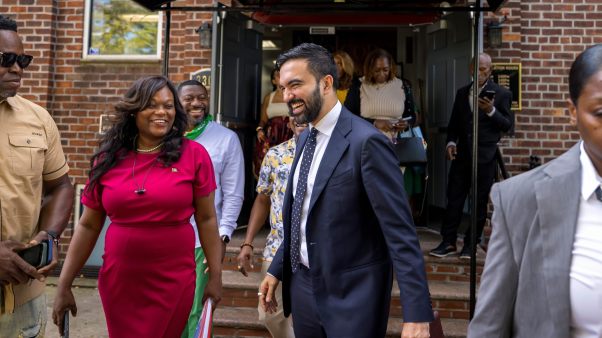Low box office totals this weekend once again begged the old chicken-and-the-egg question: Does Hollywood release its second-rate movies in the dead of winter because business has slowed to a trickle, or does business slow this time of year because of the substandard movies? At any rate, the lackluster slate of new releases provided easy targets for critical skewering.
Next Friday ($8 million)
Two more Christian critics jeered the pothead comedy Next Friday, which took the box office crown despite losing almost half its business. Movieguide criticized the movie not only for its offensive content like “marijuana use, laziness and sexual immorality,” but also for displaying almost no sense of comic timing.” The U.S. Catholic Conference likewise felt that “the cast squeezes out nothing but cheap laughs from the thin material.”
Down to You ($7.6 million)
Rookie entry Down to You also performed below expectations, taking in less than half of the debut of She’s All That, last year’s similar young-adult romance that also starred Freddie Prinze Jr. Maybe the over-used formula hurt the newcomer; Down to You was characterized as a “cookie-cutter film” that wraps up all the loose ends too predictably by the U.S. Catholic Conference. Mary Draughon of Preview was more disappointed with the movie’s implication “that a casual attitude about sex is universal,” since the main characters’ long wait for sex “makes the couple something of a novelty among their friends.” She finds a small measure of nostalgic worth in the movie, saying “anyone who remembers their first love will find much to smile about.” The Catholic Conference, on the other hand, felt the film “romanticizes the thrill of first love.”
The Hurricane ($6.5 million)
Since there are no new reviews this week on the story of Rubin Carter’s wrongful imprisonment, I’ll share my take on The Hurricane. This impressive film falls short of greatness by refusing to trust its audience to understand the systemic racism that put Carter behind bars, instead inventing a racist, corrupt cop for viewers to detest. With the lines of good and evil so clearly drawn, the story feels removed from a reality where the two mingle in each heart. It’s a credit to Denzel Washington’s performance that the movie still works; his nuanced portrayal of Carter lets us understand the interplay between love and hate in his heart, at least. Carter begins his sentence trying to kill desire; he finds it too painful to want what the prison can take away from him, so he learns to desire nothing. I recognized this tactic, having used it often to content myself with the way the world is instead of listening to my passions to change it. It hurts less that way. But at its core The Hurricane is about what happens next: Carter risks his isolated contentment in order to befriend a young man who writes him. He allows both love and pain a chance to break through his walls. On this level, the film is an encouragement to keep my heart open and my desires alive.
Stuart Little ($6.4 million)
Two new reviews took differing views on Stuart Little, which most Christian critics have found fun and family-friendly. Childcare Action sided with the majority, calling the movie a “positive influence” and suggesting that it could have easily been rated G. The story of a mouse who is adopted into a human family is, in its opinion, “efficient at showing how even though one may not like or may even hate a family member, one can still show love and compassion for and tolerance of the undesirable member.” But Hollywood Jesus was somewhat less enthralled. Editor David Bruce acknowledged that the film “speaks to the issue of family harmony,” but said it was just “not the most moving film I have ever watched.” He notes a downside of depicting “the perfect type of family that many want”—most will find such perfection “difficult to achieve.”
The Green Mile ($5.4 million)
So far, this tale of a miracle-worker on death row has received much flak from Christian reviewers for “pop supernaturalism.” But two reviews this week speak in superlatives about the spiritual elements in The Green Mile. Phil Boatwright, The Movie Reporter, said “this may be the year’s best film with its reverence for things not seen, … a profound movie that respectfully raises questions concerning God’s power and man’s ability to do great good or great evil.” Childcare Action echoed this praise, despite reservations over the film’s R-rated content. “I am uncomfortable about saying this, but The Green Mile was quite probably the best movie I have seen in a very long time. … [It] presents man’s impression of supernatural powers but did so in less of a ghostly way but in more of a spiritual way.”
Rounding Out the Top Ten
Childcare Action also bucked Christian-review trends with its take on sixth-place finisher Galaxy Quest. So far, the film has been highly praised as a witty and inventive comedy that’s great for families. But Childcare Action thought Sigourney Weaver’s outfit, which is torn partway through the film to reveal substantial cleavage, is inappropriate for young audiences. “I found it curious to learn that as an actress and an actor proceed through the same activities and are exposed to the same forces, the woman’s clothing suffers progressively revealing damage while his clothing does not.”Falling to seventh place is Girl, Interrupted, which is based on the true story of Susanna Kaysen’s stay in a mental institution during the 1960s. Star Winona Ryder has said she was drawn to the project because as a teen she identified with Kaysen’s aimlessness and aloneness, but according to Steven Isaac of Focus on the Family, this new movie isn’t likely to offer to teens the same consolation. “Girl, Interrupted is a dreary indulgence into the world of mental disorders, despair and hatred with little offered to lift the gloom. Many teens may find affinity with Susanna’s disenfranchised existence, but they won’t get much hope in return.” The Phantom Tollbooth‘s J. Robert Parks felt similarly let down. “The whole movie has a well-made exterior but with little real meaning. It’s never clear if Kaysen should’ve been committed or whether the experience helped or hurt her in any way.” Movie Parables, on the other hand, finds a measure of hope in the film because Susanna learns she must rely on others for healing. “Vanessa Redgrave, Whoopi Goldberg, and Jeffery Tambor give solid performances as the medical support staff at the institution whom Susanna initially distrusts and disrespects, only to find that she needs their guidance to find her way out of the disturbed mental state in which she is dwelling.”No new reviews were available for The Talented Mr. Ripley, which finished in eighth place this week, so I’ll offer my opinion of the thriller. I really wanted to like this adaptation of Patricia Highsmith’s novel, since writer/director Anthony Minghella had altered the title character from a calculating, amoral killer to a murderer driven by desperation and self-preservation, who understands his own rotted soul. But this alteration leeches away the story’s moral implications. In the novel, Tom Ripley murders a character and assumes his identity because he coveted the man’s lifestyle. This can be seen as a clear indictment of covetousness. But in the movie, Ripley assumes the man’s identity only to cover up the murder, committed in a fit of rage after being insulted. The lesson now becomes “Don’t kill people who insult you,” which is somehow less powerful. It seems to me like a colossal waste of talent to yield such piffle.The boxing comedy Play It to the Bone opened to a one-two punch of scathing reviews and an awful ninth-place finish. “The film flounders with all the appeal of a dead fish,” writes Movie Parables, citing the “good cast but awful acting” and an “interesting premise but terrible execution.” The U.S. Catholic Conference deadpans that “artificially voluptuous women and crude dialogue make a poor substitute for plot and character development.” But the most irksome element for Christian reviewers is what Movieguide terms “a decidedly anti-Christian spin,” embodied by the “main character, Vince, who claims to be Christian but who fails to live up to that name.” Preview‘s John Evans elaborates: “Vince openly professes to be a Christian and sees visions of Jesus, but freely indulges in obscenities and promiscuous sex.”Angela’s Ashes moved up to the top ten this week, despite playing on only 610 screens, as the adaptation of Frank McCourt’s bestselling memoir continued to expand into wider release. The U.S. Catholic Conference echoed the general opinion of mainstream critics, saying “the sober, disciplined movie lacks both the poetic flair and humorous punctuation of the book.” Other Christian critics were likewise disapproving, although their reasoning wasn’t always sound. For instance, Movieguide warned against both the “strong sexual content” and the depiction of “a miserable life of nearly unrelieved poverty and boredom.” I understand the sentiment, as Mary Draughon of Preview puts it, that “for the average moviegoer, it’s much too depressing.” But since Christians are specifically called to minister to the poor, it seems strange to me that watching poverty on-screen would warrant such cautioning. Movie Parables also makes a dubious assertion, questioning the McCourt family’s religious practices because they “obviously did nothing to rescue them from the hard and abusive life we see unfolding on screen.” Quality of life seems like an ineffective gauge of one’s faith, though, especially since Jesus promises suffering for his followers. At least one critic enjoyed the film, however; J. Robert Parks of The Phantom Tollbooth looked past the dreary mood and found inspiration in Frank’s “lovable, if flawed,” parents. “These are two people trying to hold a marriage together despite their outer surroundings and inner demons.”Steve Lansingh is editor ofthefilmforum.com, a weekly Internet magazine devoted to Christianity and the cinema.
Copyright © 2000 Christianity Today. Click for reprint information.








